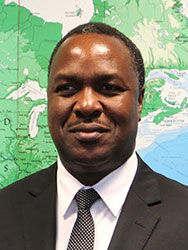Q and A with Dr Elioda Tumwesigye, former Fogarty trainee and Ugandan Minister of Science, Technology and Innovation
May / June 2017 | Volume 16, Issue 3

Photo by Karin Zeitvogel
Elioda Tumwesigye, M.D., M.Sc.
Dr. Elioda Tumwesigye was hand-picked by President Yoweri Museveni to lead
Uganda's Ministry of Science, Technology and Innovation when it was founded in June 2016. Prior to that, Tumwesigye worked as a medical doctor, led prevention of mother-to-child transmission and other HIV-AIDS programs in Uganda, and has been a member of parliament since 2001. The founder and chair of the first standing committee for HIV-AIDS in an African legislature, Tumwesigye holds an M.D. from Makerere University and a master's degree from Case Western Reserve University in Ohio, which he attended on a Fogarty scholarship.
What impact has Fogarty had on your career?
Without Fogarty, I quite simply wouldn't be who I am today. It all started when I won a scholarship through Fogarty's
AIDS International Training and Research Program (AITRP) and Makerere University in Uganda, to do a master's in epidemiology and biostatistics at Case Western Reserve University in the U.S. in 1995.
For the first time in my life, I left Uganda, flew on a plane, crossed the Atlantic - and when I got to Case Western in Cleveland and started studying, I used a computer for the first time! I had gone through primary, secondary school and university, even started working as a doctor without ever touching a computer. Here I was in the U.S., learning how to use WordPerfect, learning how to print, how to have an email address, how to use the internet - and how to do cutting-edge research. After earning my master's degree, I returned to Uganda and began to capitalize on my new skills.
Without Fogarty, I quite simply wouldn't be who I am today.
Dr. Elioda Tumwesigye
Uganda's Minister of Science, Technology and Innovation
Former Fogarty trainee
How has your Fogarty training helped Uganda?
One of the first things I did when I went back to Uganda was to establish a research center in a rural area. It has grown to be one of the premiere research centers in the country, providing free care to thousands of AIDS patients, with support from PEPFAR.
At the center, we were able to do door-to-door HIV counseling and testing in which we reached out to couples, ensured that the whole community was tested, and provided treatment to those who were found to be HIV-infected. Through the program, we identified a number of discordant couples and, working with the University of Washington, were able to show that by using a single drug, HIV transmission to the negative spouse could be reduced by more than 75 percent.
The training I got with support from Fogarty helped me to achieve this. My Fogarty training has also helped me to reach other career milestones - including starting the first standing committee on HIV in any African parliament and being chosen to head the ministry of science, technology and innovation that President Yoweri Museveni established in 2016.
What are the goals of the new ministry?
At the ministry, we aim to use science, technology and innovation to reduce hunger, promote good health, fight diseases, ensure that our people are able to get jobs, ensure that we are able to grow the economy of Uganda. I hope to work with Fogarty and NIH to achieve those goals.
Fogarty has already done a lot to support and grow research capacity in Uganda. Many of my colleagues went to U.S. universities with Fogarty support, and you find that a lot of scientists who form the core of research at Ugandan universities - from immunologists to epidemiologists to microbiologists to molecular biologists - have been trained with support from Fogarty. There are many Fogarty fellows and Fogarty-supported scientists in Uganda who have gone on to train others and build capacity, who have established research projects, who have been able to publish and do cutting-edge scientific research. But as a developing country, we're still not where we want to be.
How can Uganda achieve its research goals?
We have to continue to nurture our scientists, to bring them to NIH to get training so that they can go back to Uganda and build research capacity. It's good to train people locally but I think Fogarty needs to be given more money to continue to offer training opportunities in the U.S. Sure, when you train people locally you can train many more, but when people come to NIH, they are exposed to strong work ethics, they see how labs are run, they look at the way people do things - and they come back to Uganda as changed people.
More Information
To view Adobe PDF files,
download current, free accessible plug-ins from Adobe's website.